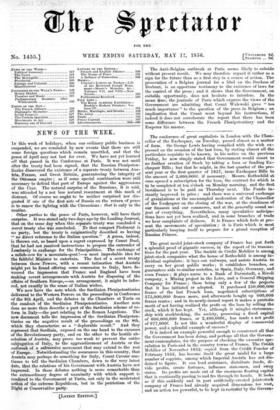NEWS OF THE WEEK,
IN this week of holidays, when our ordinary public business is suspended, we are reminded by new events that there are still
some foreign questions which remain unsettled, and that the peace of April may not last for ever. We have not yet learned all that passed in the Conference at Paris. It was not until after the treaty had been signed, that the Russian Plenipoten- tiaries discovered the existence of a separate treaty between Aus- tria, France, and Great BriMin, guaranteeing the integrity of the Ottoman empire ; as if some special combination were still necessary to defend that part of Europe against the aggressions of the Czar. The natural surprise of the Russians, it is said, was attended by a not less natural resentment at this mark of distrust. Of course we ought to be neither surprised nor dis- gusted if one of the first acts of Russia on the return of peace is to renew the fighting with the Circassian : that is only in the routine.
Other parties to the peace of Paris, however, will have their surprise. It was stated only two days ago by the Leading Journal, that on the same day when this separate treaty was concluded a secret treaty also was concluded. To that compact Piedmont is no party, but the treaty is enigmatically described as having " no direct reference to the Italian question." A guess, indeed, is thrown out, as based upon a regret expressed by Count Buol, that he had not received instructions to propose the surrender of Lombardy in exchange for the Principalities. The exchange of a ranch-cow for a mountain-goat !—a most improbable idea for the faithful Minister to entertain. The fact of a secret treaty between those Powers, with a recent intimation that Austria might yet be found offering some concession to Italy, have fa- voured the impression that France and England have been making covert arrangements with Austria for disposing of the affairs of Southern Europe,—an arrangement, it might be infer- red, not exactly in the sense of Italian wishes.
We now have the note which the Sardinian Plenipotentiaries -delivered to the Western Powers on the proceedings in Conference -of the 8th April, and the debates in the Chambers at Turin on the conduct of the Sardinian Plenipotentiaries. Another note -does no more than describe a part of the Sardinian scheme of re- form in Italy—the part relating to the Roman Legations. The new document tells the impression of the Sardinian Plenipoten- tiaries on the negative result of the proceedings on the 8th, which they characterize as a " deplorable result." And they represent that Sardinia, exposed on the one hand to the excesses of the Revolutionary party, and on the other to the hostile ab- solutism of Austria, may prove too weak to prevent the entire subjugation of Italy, to the aggrandizement of Austria or the outbreak of a subversive movement that may extend to the rest of Europe. Notwithstanding the assurances in this country, that Austria may perhaps do something for Italy, Count Cavonr con- tinues to tell the Sardinian Chambers, down to the very latest date, that the-relations of his Government with Austria have not improved. In these debates nothing is more remarkable than the extraordinary degree of unanimity with which support is rendered to the Government at Turin, not only in the moderated action of the extreme Republican, but in the patriotism of the Right or Conservative party. The Anti-Belgian outbreak at Paris seems likely to subside without present result. We may therefore regard it rather as a sign for the future than as a first step in a course of action. The prosecution of a Belgian journal for a libel on the Duchess of Brabant, is an opportune testimony to the existence of laws for the control of the press ; and it shows that the Government, on suitable opportunity, does not hesitate to interfere. In the mean time, the journals of Paris which express the views of the Government are admitting that Count Walewski gave " too much importance" to the question of the press in Belgium ; an implication that the Count went beyond his instructions, if indeed it does not corroborate the report that there has been some difference between the French Plenipotentiary and the Emperor his master.


























